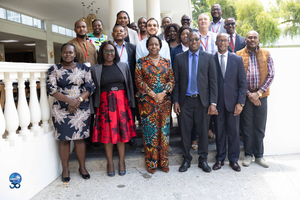Those continuing to deny UNSC permanent membership must be called out: India
United Nations, Aug 22 (IANS) India has called for discrediting those opposing the expansion of the permanent membership of the Security Council and denying Africa’s “rightful place”.
“Those who continue to deny the expansion of permanent category and Africa’s rightful place in it must be called out,” R. Ravindra, the charge d’affaires of India’s UN Mission said on Wednesday.
“Africa’s continued denial of representation in the permanent category of membership is a blot on the collective credibility of this council,” he said at the High-Level Open Debate on Peacebuilding and Sustaining Peace convened by Sierra Leone, the Council’s president.
India has always called for permanent African representation in an expanded Council and supports the African consensus demanding two permanent seats and increasing the elected seats for the continent from three to five, Ravindra said.
He pointed out that nearly 70 per cent of the Council’s mandates for peacekeeping are for Africa.
Reforming the Council, an endeavour blocked for nearly a couple of decades is seeing a renewed push from African nations demanding action in time for the 80th anniversary of the UN’s founding next year.
A 12-member group, Uniting for Consensus, has used procedural manoeuvres to prevent the reform process from advancing because of opposition to certain countries getting permanent seats.
The group is led by Italy and includes Pakistan and Canada.
Ravindra dismissed with contempt an attempt by Pakistan’s Permanent Representative Munir Akram to raise the Kashmir issue and tie it to the Palestine issue.
“We earlier heard a delegation repeating again its falsehood about my country. I will not dignify this falsehood with a response in the interest of time. Such remarks deserve nothing but contemptuous dismissal,” he said.
Ravindra did not mention Pakistan by name as that would have given it an opportunity to turn its right of reply into a megaphone for propaganda.
But the message was clear that he was referring to Akram, who had said, “The consequences of foreign occupation are nowhere as clear as in occupied Jammu and Kashmir and in Palestine”.
Having failed to get any international attention for its line on Kashmir, Islamabad now tries — so far unsuccessfully — to tie it to the Palestine issue which has wider support.
Ravindra said that “terrorism is a global threat, not only to peace and security but also to development” and reiterated India’s call for a comprehensive international anti-terrorism convention.
A global conflict prevention mechanism cannot be complete without a comprehensive approach to counter-terrorism, he added.
Preventing conflicts and promoting peace and security requires resources for socio-economic development and reforming the international financial institutions to provide more representation from the Global South on governing bodies.
Given the importance of development for peace-building, India has extensive development partnerships with countries in the Global South and the cumulative value of its developmental projects now exceeds $40 billion, he said.
At the third Voice of the Global South virtual Summit hosted last week by India, Prime Minister Narendra Modi proposed a comprehensive global development compact, he said.
Sierra Leone’s Foreign Minister Alhaji Musa Timothy Kabba, who presided over the meeting, warned the “world remains on fire from both national and international conflicts” and it was “fueled by a complex interplay of geopolitical tensions, economic disparities, climate change, and the proliferation of weapons”.
He said that a multi-pronged effort, including on the development front, by all countries was needed to face the challenges.
(Arul Louis can be contacted at arul.l@ians.in and followed at @arulouis)
–IANS
arul/dpb




